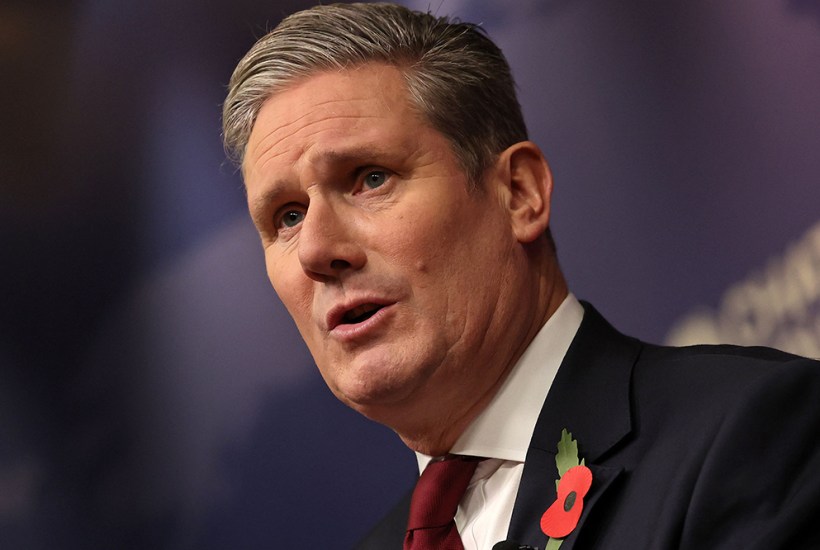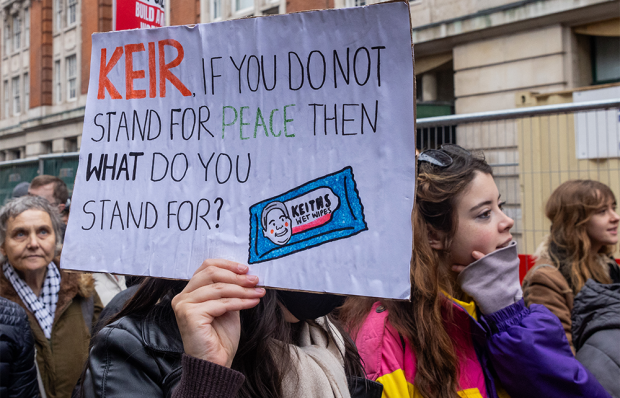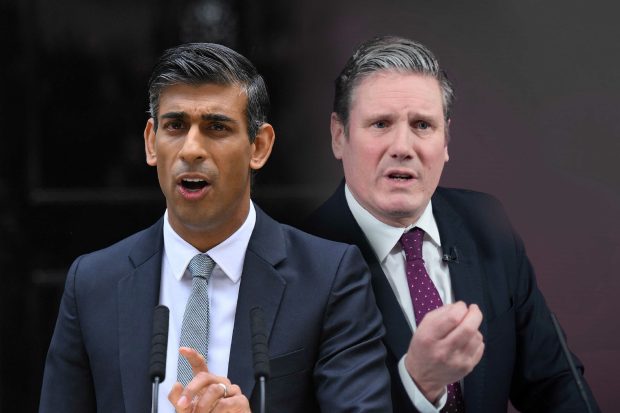This could have been the week that Keir Starmer buckled under pressure from his party and called for a ceasefire in Gaza. A fifth of his MPs have publicly backed one, including 13 frontbenchers and big names such as Anas Sarwar, Sadiq Khan and Andy Burnham. Starmer’s suggestion in a radio interview that Israel could be justified in defending itself by cutting off electricity and water to Gaza had already led to more than 25 Labour councillors quitting, while several shadow ministers are on resignation watch.
Instead of U-turning in the face of party mutiny, Starmer doubled down. A ceasefire freezes a conflict, he said, and would leave Hamas ‘with the infrastructure and the capabilities’ to carry out a second attack on Israel. It was not quite a Clause-IV moment, but a significant one nonetheless. He knows that he is facing a test for a would-be prime minister. Many floating voters want to know: would he stand up to his party? He’s now given the answer.
Or at least he’d like it to be seen that way. In private, he’s more equivocal and is yet to discipline a single shadow minister for not towing the party line. ‘He knows if he did then resignations would follow,’ says a senior party figure. He suspended the Labour whip from a backbencher for using the controversial phrase ‘between the river and the sea’, but only after the Tories sacked a ministerial aide for contradicting the government line. As the conflict in Gaza goes on, Starmer will face more internal criticism for his position. His best hope is that Joe Biden calls for a ceasefire soon. ‘Keir needs cover to do it,’ says a sympathetic Labour MP.
While the issue of the European Union has traditionally divided the Tories, Labour’s sensitivity is Israel. ‘You couldn’t design a worse crisis for us,’ sighs a Labour aide. During the Yom Kippur war in 1973, Harold Wilson, as leader of the opposition, wanted to impose a three-line whip on a motion demanding the Tory government send arms to Israel. His deputy, Roy Jenkins, cautioned against it – to which Wilson replied: ‘I’ve accommodated your effing conscience for years. Now you’re going to have to take account of mine.’
Support for Israel cost even Tony Blair dearly in the end. His refusal to call for a ceasefire when Israel retaliated against Hezbollah kidnapping two soldiers led to a cabinet revolt which was the trigger for his eventual departure. Starmer is not animated by foreign policy in the Middle East in the way his predecessor, Jeremy Corbyn, was. As a Labour MP, Starmer raised Palestine only twice in his eight years in parliament before 7 October; in contrast, Corbyn did so 53 times since 2005.
Starmer wants to show that a Labour government can be trusted on foreign affairs. That means behaving like a government-in-waiting and acting in line with the UK’s allies, particularly Washington. But in doing so, he risks creating both an electoral problem and a party-management issue.
Labour’s divisions over Israel are more complicated than a simple case of the party right vs the hard left. The unhappiness of feeling is widespread – including among some shadow cabinet members on the right of the party. A lot of the sentiment is related to demographics. The shadow frontbenchers who go against the party line tend to be those who have large Muslim communities in their constituencies, such as Jess Phillips in Birmingham.
The electoral concern is Starmer’s position could lead to many pro-Palestine Muslim voters staying at home at the next general election. There are seats – such as Bolton – where this could make a big difference. Labour strategists in Scotland worry that they could lose a few seats to the SNP, which has called for a ceasefire. One senior Labour politician fears that a George Galloway-style party could emerge to stoke division.
One problem for Starmer is that the backlash in his party is a reminder to voters that while Labour’s leadership has changed, the party still has the same MPs. ‘This is what we do,’ says a Labour party figure. ‘Fight about foreign policy.’
More immediately, Starmer’s grip on his party is in question. While he and his team are keen to play down talk of disunity, most accept governing will be tricky in the party’s current state. ‘You would need to have collective responsibility on foreign policy,’ says a Labour old-timer. ‘The fact he can’t manage it speaks volumes.’ Some in Starmer’s inner circle complain that he should be focused on the cost of living rather than foreign policy debates, which have much less resonance with most voters.
But they are likely to be disappointed. It’s not just Israel/Palestine that could become an open sore for the party. There are two upcoming foreign elections that could cause Starmer a lot of trouble. The first is November’s US presidential campaign, which could overlap with the UK general election for the first time since 1964. If it looks as if Donald Trump will return to the White House, Starmer will need to choose between statesman-like comments or playing to his base. His shadow foreign secretary, David Lammy, joined a protest in 2018 trying to bar Trump – ‘this tyrant in a toupee’ – from a UK state visit.
The Indian general election in the spring will cause even more trouble for Starmer. He wants to win back Indian voters – the UK’s largest ethnic minority community – who abandoned Labour in large numbers in 2019 after the party voted for a motion at conference criticising India’s actions towards Muslim-majority Kashmir. Starmer has already changed the party position to be more supportive of the Modi government. Yet in the Batley and Spen by-election in 2021, where votes from Muslim communities were needed, a Labour leaflet was issued with a picture of Modi and Boris Johnson together, suggesting that a Tory MP would not be good for their interests. As Modi seeks re-election, Starmer will once again come under pressure to take a side.
In all these cases, the problem for the Labour leader is that the things he needs to say in order to show that he’s serious about governing are the same things that will put him in a difficult position with large portions of his party.
Got something to add? Join the discussion and comment below.
Get 10 issues for just $10
Subscribe to The Spectator Australia today for the next 10 magazine issues, plus full online access, for just $10.
You might disagree with half of it, but you’ll enjoy reading all of it. Try your first month for free, then just $2 a week for the remainder of your first year.















Comments
Don't miss out
Join the conversation with other Spectator Australia readers. Subscribe to leave a comment.
SUBSCRIBEAlready a subscriber? Log in